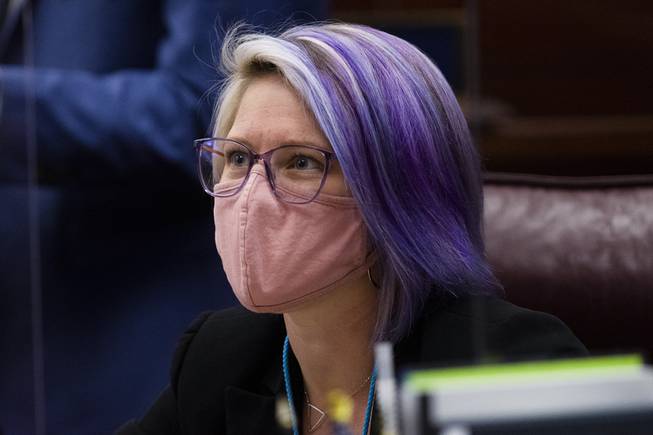
David Calvert/The Nevada Independent, pool) / Associated Press
Assemblywoman Sarah Peters is pictured inside the Nevada Legislature on March 15, 2021, in Carson City.
Friday, Sept. 15, 2023 | 2 a.m.
Nevada Assemblywoman Sarah Peters had a choice to make as she was preparing to take office for her first term in 2019.
The Reno Democrat had a head of bright purple shoulder-length hair, as well as a small number of tattoos and piercings. Peters told the Sun recently she deliberated whether to change her appearance out of respect for the office she was about to assume.
To Peters, it was more than just conforming to the so-called norms expected with being in the public eye. It was a personal crossroads for a cause she considered much bigger than herself.
“I battled with the idea — do I tone down my hair color? Do I wear long-sleeve shirts? Do I take my piercings out and show up in the way that is expected for someone who wants this position?” Peters recalled. “I know a lot of those are personal choices, right? Like I personally choose the color of my hair, but it is the most authentic expression of myself.”
Fast forward to March 2021, when Peters made an impassioned speech on the Assembly floor, formally coming out as pansexual — which is defined by Human Rights Campaign as a potential sexual, romantic or emotional attraction toward people of all genders, regardless of their sex or gender identity.
That made her the first Nevada lawmaker to ever identify as pansexual, and she remains one of a few public officials nationwide to carry the label.
It’s one of the many reasons Peters was honored Thursday at the Silver State Equality Awards at the Palms, hosted by the state’s largest LGBTQ+ civil rights organization of the same name. She received the Equality Leadership Award in part for her legislative track record for voting to protect LGBTQ+ rights, but also for how open she’s been about grappling with her own sexuality.
“We work to honor folks who have actually done the work in Nevada to advance equality, and that’s something that Assembly member Peters has done, hands down,” said Andre Wadé, executive director of Silver State Equality. “We value that visibility and we value the hard work, and when we have the opportunity to applaud people, we want to do just that.”
In the weeks and months that followed Peters’ coming out, she received messages calling her “blasphemous” and “selfish” for using the Assembly floor to make such an announcement, she said. But she tuned out those negative messages in favor of the outpouring of support from friends and colleagues, as well as LGBTQ+ residents across the state.
“I do think that as more people look at the world in their authentic expression and want to be seen for who they are, that representation matters across all spectrums,” Peters said. “There is power in privilege that we can use to uplift our other brothers and sisters and persons who are experiencing greater adversity than we are.”
During her first term, Peters introduced a bill that sought to require single-occupancy public restroom stalls to be as “inclusive and accessible to all genders as possible,” which was ultimately signed into law by then-Gov. Steve Sisolak. That caught the attention of Wade and other LGBTQ+ advocates in the state.
“It’s time for us to recognize their hard work,” Wade said of Peters, opting to use gender-neutral phrasing. “Because without it, we wouldn’t have these advancements in Nevada that we rely on and the people in Nevada rely on.”
Peters is also the chair of the newly formed LGBTQ+ Caucus, which legislators announced in February would “move the state forward” in advancing civil rights for those who identify as LGBTQ+.
Democratic lawmakers were successful in passing a slew of new laws to bolster such protections, such as one bill that allows people to amend their marriage license to reflect their new chosen name, and Senate Bill 163, which prohibits medical insurers from discriminating on the grounds of gender identity or gender expression.
Peters said part of the reason she came out so publicly was to show others that it was OK to show that “authentic expression” of self. She is in a heteronormative marriage and often doubted whether she was “queer enough” to label herself as LGBTQ+, but figured ultimately she could use her privilege to open the doors for others in the community.
“I realized that it was more important for me to lean into the nonheteronormative side of my life,” Peters said. “I think it’s really easy when you have privilege to mask with that privilege because it makes spaces feel more comfortable. But it is not authentic and it doesn’t open the door in the way that I wanted to use my privilege and my leadership roles and my power in this position as an assemblyperson.”
While Peters hasn’t been the primary sponsor behind many of the bills passed in recent years bolstering LGBTQ+ rights, she has worked to include nonbinary language in bills pertaining to reproductive health, and crafting inclusive language in other legislation.
Ultimately, Peters wants others struggling with their identity to know they aren’t alone, and at the least should feel open to express who they really are.
“The ‘Peoples’ House’ is for all people,” Peters said, “regardless of what clothing you choose to wear, or what hairstyle you have, or what authentic expression of yourself shows up. We all deserve to have a seat in that house.”
[email protected] / 702-990-2681 / @Casey_Harrison1
